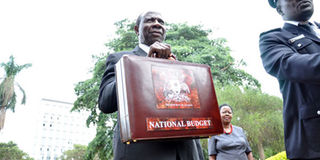Government plans to raid oil fund to finance 2019 budget

Finance minister Matia Kasaija arrives Serena Hotel in Kampala for budget reading recently. Government plans to withdraw Shs445b from the Petroleum Fund to finance the budget for this financial year 2019/2020. FILE PHOTO
What you need to know:
- The Petroleum Fund, established in March 2015 by the Public Finance Management Act, is overseen by the BoU.
- Earlier in March, Finance minister Matia Kasaija inaugurated the seven-member committee of the PRIR’s advisory committee led by Prof Samuel Sejjaaka.
Government plans to withdraw Shs445b from the Petroleum Fund to finance the budget for this financial year 2019/2020, which is, however less by Shs143b of the available balance, the Bank of Uganda annual report released on Wednesday shows.
The report detailed that the Fund had a combined balance of Shs301b ($74.8m) on the dollar account and Shs28.2b on the shillings account, at the start of the financial year in July.
However, the planned withdrawal “for transfer to the Consolidated Fund” to finance the budget is Shs445b, and no appropriations were made to go to the Petroleum Revenue Investment Reserve, money which is supposed to be invested.
Mr Kenneth Mugambe, the director for budget in Ministry of Finance, was not readily available for comment but the Accountant General, Mr Lawrence Semakula, told Daily Monitor yesterday that they “will work with the available money”.
“It is true there is not enough money. What it means is we have to borrow to cover the gap or have to constrain the (discretionary) expenditure side, but will see what to do,” Mr Semakula said in a telephone interview.
The last inflow to the Fund, according to the BoU report, was $1.4m (about Shs5b) on the dollar account and Shs54.7b on the shillings account last year.
The Finance ministry, however, withdrew Shs200b during the same period to plug a deficit.
In total, government has withdrawn more than Shs300b from the Fund since inception.
At the beginning of the new financial year in July, government was banking on replenishing the Fund with Capital Gains Tax payment of $167m (Shs610b) off the Anglo-Irish Tullow Oil farm down transaction to French Total E&P and China’s Cnooc. The deal collapsed in late August.
The Petroleum Fund, established in March 2015 by the Public Finance Management Act, is overseen by the BoU.
The Fund has two objectives; financing the budget and saving/investment for the future generations through appropriations to the Petroleum Revenue Investment Reserve (PRIR).
According to section 62 of the Public Finance Management Act, 2015, Parliament shall every financial year appropriate money to be paid from the Petroleum Fund to the (PRIR), which shall be invested in accordance with the petroleum revenue investment policy issued by the Finance minister in consultation with the Secretary to the Treasury on the advice of the Investment Advisory Committee.
However, the BoU report indicates that since establishment of the Fund four years ago, no appropriation has ever been made to the PRIR, which will be managed separately from the Central Bank Reserves.
Earlier in March, Finance minister Matia Kasaija inaugurated the seven-member committee of the PRIR’s advisory committee led by Prof Samuel Sejjaaka.
Prof Ssejjjaaka yesterday acknowledged that no appropriations have been made to the PRIR pending establishment of several “working modalities” including the petroleum revenue investment policy.
“There have been some proposals that have been put forward to operationalise but once they have been approved, appropriations will start,” he added.
The start of commercial oil production in Uganda, according to the World Bank, offers long-term prospects to diversify the economy.
Prospects
With commercial oil production at peak, the World Bank estimates show that Uganda could earn up to $3b (about Shs7 trillion) in revenues from exports of up to 60,000 barrels of oil per day. These revenues have the potential to propel the economy between 7-10 per cent forecast up from the current stagnation of 4 per cent. However, the World Bank says this is only possible if revenues are channelled to development of human capital—education, institution building, good governance and transparency, properly managed through an efficient and transparent strategy, and if an effective sharing formula is ensured for revenues to trickle down to local government entities.
[email protected]




